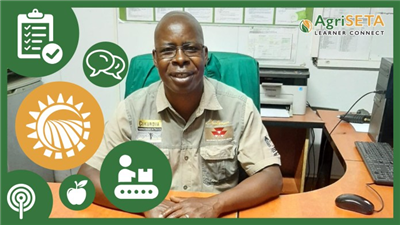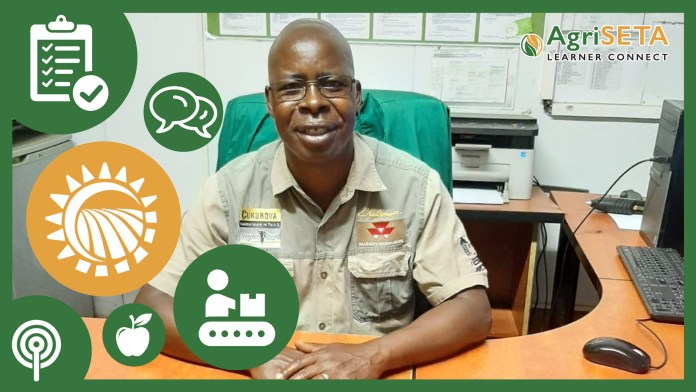AgriSETA Learner Connect: Meet a packhouse manager
Published: Friday, September 11, 2020
As a packhouse manager for a produce farm Raphias Sithole sits in the centre of a complex web of supply and demand

11th Sep 2020
“Successful farming calls for working hard and having faith,” says Raphias Sithole (43). He is packhouse manager at Pinocchio’s Farms in Gauteng. He firmly believes that farming needs an on-the-ground hands-on commitment and cannot be done remotely.
Sithole’s day starts early, even before the farm rooster crows. His job involves deciding on what is acceptable quality produce; when to harvest produce and sourcing quality unprocessed crops from growers. He has to ensure that the process flows are efficiently and effectively managed. The timely dispatch of processed products to customers and ensuring that there is enough supply of raw products from primary producers are all part of his responsibilities.
He loves working in this sector. “It is a multidisciplinary field, hands-on and very practical. Agriculture is measurable,” he says.
This is another exciting career being featured on our AgriSETA Learner Connect campaign. Presented in partnership with Food For Mzansi and 19 different radio stations, we’re exploring the diverse career options in the agricultural sector every single day.
AgriSETA Learner Connect is also free on your favourite podcast channels, including Spotify, Apple Podcasts and Google Podcasts.
Ok, now it’s over to Raphias Sithole, packhouse manager at Pinocchio’s Farms in Gauteng.
1. Could you sum up your job for us? I set up produce acceptable quality criteria for harvesting of produce from different sections on the farm. I source quality unprocessed crops from primary producers and out growers. Another part of the job is to manage process flows efficiently and effectively and to ensure timely the dispatch of processed crop products to customers. I also ensure enough supply of raw product from primary producers. A critical part of the job is managing and enforcing food safety measures and processes. This job cannot be done without people, so I have to manage staff performance and provide leadership to all staff in all issues related to their work.
2. So, what does the day-to-day of your job entail? I manage and ensure safety in the packhouse, with health checks for the staff that work in the packhouse for they are always in contact with food. I ensure that all machines are running effectively and that constant maintenance and thorough cleaning of the machines are done and check temperature controls of the cold rooms for proper cooling of both processed and unprocessed produce. My responsibilities also include maintaining stock levels of packaging materials, distribution of produce to different markets thus dispatching and avoiding overstaffing in order to minimise costs. There are high cost such as electricity, packaging material and labour, these need to be scrutinised and monitored properly in order to reduce losses. I make sure we pack insect and disease-free produce.
3. What qualification do you need for this career? You will need an agricultural degree or diploma. Food safety training, Global Gap training and an HACCP certification, which is an international standard defining the requirements for effective control of food safety.
4. What are the character traits you need to be great at your job? You need to be a self-starter and have the ability to work without supervision.
5. What subjects do I need to become an agricultural engineer? Agriculture, mathematics and life science.
6. What do you love about agriculture as a space to work in? It is a multidisciplinary field, hands-on and very practical. We work in food production for the nation, feeding people especially in Africa where poverty is our number one enemy. We reduce poverty levels by creating employment in the community. I love that agriculture is measurable, for instance 1000 tomato plants give a minimum 7 000 kgs of tomatoes over six months. This is about seven kilograms per plant.
7. Don’t be modest, tell us about your proudest career moments? The day I was appointed the packhouse manager from the field manager was a very proud day. When most suppliers are without product, big chain stores depend on me for their supplies because of the careful planning that goes into our work. I love achieving timelines and getting positive feedback from happy customers, thus gaining maximum good will.
8. What do you do when you’re not at work? I enjoying taking my family out to spend quality time with them. Also, spending time visiting new farmers who need assistance in farming in different areas.
9. Any advice for young people who are inspired by your career story here on AgriSETA Learner Connect? Agriculture is emerging as one of the sectors attracting young talent because of advances in technology. The use of digital tools, drones and precision farming techniques will make for an interesting future and will demand a lot of skills that were not previously required in the sector. More schools are offering agriculture courses from primary level. The learners must take agriculture seriously.
Agriculture is largely diversified in such a way that there are different careers that are found within the agricultural space. One can be a soil scientist, plant physiologist or agronomist, vert sergeant or pest control specialist. Learners must be urged to see farming as a business. They must be encouraged to have more farm visits to broaden their exposure to farming. It can also help if they listen to agricultural presentations on TV and radio. It will give leaners the chance to have more interest in farming.
10. Where can I study to become an agricultural engineer? A person can begin their career by enrolling at any agricultural college. Leaners can also have hands-on training under supervision of a packhouse or farm manager through apprenticeships. One can also enrol at institutions like Buhle Academy in Pretoria, Dicla training in Krugersdorp and Thutho Ya Setshaba in Klerksdorp.
How to listen to AgriSETA Learner Connect:
Option 1: Click here to listen on Spotify (all mobile and other devices).
Option 2: Click here to listen on any Apple device.
Option 3: Click here to listen on Google Podcasts.
